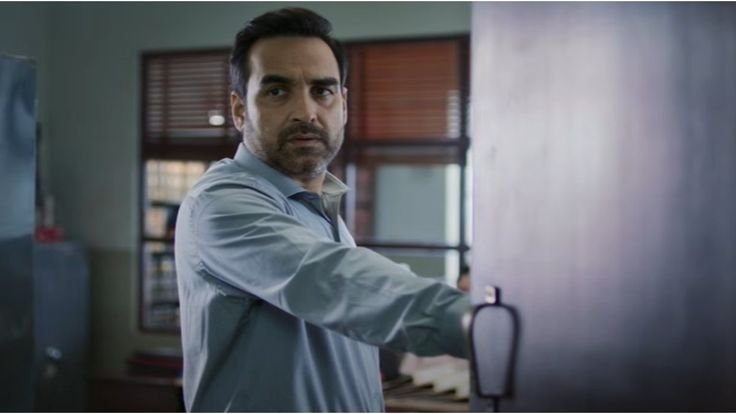Criminal Justice Season 4 Review: Pankaj Tripathi Anchors

The fourth season of Criminal Justice, titled Criminal Justice: A Family Matter, premiered on May 29, 2025. Fans of the legal drama eagerly tuned in to watch the return of the beloved lawyer Madhav Mishra, portrayed once again by the exceptionally talented Pankaj Tripathi. This season takes a more intimate turn, delving into domestic complexities, fractured relationships, and emotional confrontations, all set within the intricate web of the Indian legal system.
With every new season, the show evolves — not just in its narrative approach but also in how it highlights different shades of morality, justice, and truth. Season 4 continues this trend, combining courtroom intensity with family drama and layered performances.
Plot Summary: Justice Meets Family Chaos
In this season, the spotlight falls on Dr. Raj Nagpal, a well-known pediatrician, and his estranged wife Anju, who find themselves thrust into the middle of a murder case. Their daughter’s caretaker, Roshni Saluja, dies under suspicious circumstances, and soon after, the family becomes entangled in a complicated legal battle. Madhav Mishra steps into the storm, not just to argue a case, but to unravel the complex emotional ties that both bind and damage the people involved.
The story explores how secrets, long-standing grievances, and emotional manipulation shape the lives of those standing trial, as well as those seeking justice. Unlike earlier seasons which focused more heavily on procedural elements, Season 4 digs deeper into the psychology of family trauma and its consequences.
Cast and Performances: Powerhouse Acting at its Best
Pankaj Tripathi effortlessly slips back into the skin of Madhav Mishra. His character displays humility and wisdom in equal measure, making even the dullest legal exchanges feel like gripping dialogues. Tripathi blends dry humor with sharp intellect, giving his role a human touch that resonates with viewers from all walks of life.
Surveen Chawla, who plays Anju, delivers one of her finest performances to date. She portrays the emotional anguish of a mother and estranged wife with stunning realism. Her breakdowns feel raw, her silences speak volumes, and her vulnerability commands attention.
Mohammed Zeeshan Ayyub, playing Dr. Raj, offers a compelling portrayal of a man burdened by guilt and inner conflict. His layered acting gives complexity to a character who could have easily become a stereotype of a cold, emotionally distant father. Ayyub adds both strength and sensitivity to the role, ensuring that audiences remain invested in his journey.
Asha Negi, seen in a critical supporting role as the murdered caretaker Roshni, adds weight to the emotional impact of the series. Her scenes, although limited, leave a lasting impression and form the emotional core of the entire conflict.
Writing and Direction: Subtle, Layered, and Sometimes Uneven
Rohan Sippy, who directed this season, took a more emotional and introspective route than in previous installments. He emphasized personal storytelling over strict legal drama. While this direction adds emotional depth, it occasionally causes the narrative to drift.
Some viewers may find the early episodes slow-moving. Certain subplots, especially those related to minor supporting characters, seem undercooked or distracting. However, the emotional payoffs — especially in scenes involving courtroom revelations or private confrontations — offer satisfying storytelling.
The writing team explored themes like emotional neglect, parental responsibilities, and the blurred lines between right and wrong. They did not shy away from showing flawed characters making painful decisions, which enhances the realism of the show.
Cinematography and Music: Enhancing the Mood
The cinematography in this season keeps things grounded. The use of close-up shots during emotionally intense moments allows viewers to feel connected with the characters. The courtroom scenes maintain a claustrophobic, tense energy, while the family home sequences highlight the growing emotional distance between the characters.
The background music avoids unnecessary dramatization. The score uses silence as effectively as sound, emphasizing the seriousness of the events unfolding on screen. Subtle, haunting tones dominate scenes involving grief and confrontation, while more neutral, hopeful music accompanies scenes where Madhav Mishra works through the facts of the case.
Public and Fan Reception: A Mixed Yet Engaged Response
Audiences welcomed Pankaj Tripathi’s return with open arms. Social media platforms filled with admiration for his ability to make even mundane legal discussions seem compelling. His dialogues, facial expressions, and interactions with clients and court officials earned praise from longtime fans and critics alike.
However, the makers decided to release only the first three episodes initially, which led to considerable backlash. Fans expressed frustration over the staggered release schedule, particularly those who preferred binge-watching the entire season at once. Weekly episode drops disrupted the pacing for many viewers and dampened the momentum the first episodes had generated.
Still, loyal fans of the Criminal Justice franchise continued to follow the season, eager to see how the legal battle would unfold and how Madhav Mishra would unearth the hidden truths.
Critical Response: Strong Performances but Pacing Issues
Critics highlighted the season’s emotional depth and well-rounded performances. Several reviews praised how the show tackled sensitive family issues without resorting to melodrama. The portrayal of broken relationships and psychological damage, especially in the context of marriage and parenting, earned the series commendation.
However, critics also pointed out the lack of tightness in the script. While the previous seasons had more streamlined plots, this season takes a meandering route that may test the patience of some viewers. The slow buildup, while emotionally justified, does not always translate into gripping storytelling.
Despite these issues, critics unanimously agreed that Criminal Justice: A Family Matter remains a strong entry in the franchise, largely because of its strong cast and relevant themes.
Final Verdict: Watch for the Emotions, Stay for the Performances
Criminal Justice Season 4 attempts to evolve from a courtroom thriller into a character-driven emotional drama. It succeeds in delivering strong performances, especially from Pankaj Tripathi, Surveen Chawla, and Mohammed Zeeshan Ayyub. The series makes a conscious effort to explore complex human emotions, particularly in the face of legal and moral dilemmas.
While some viewers might feel that the show takes too long to reach its emotional peaks, the payoffs remain worth the wait. The legal elements, though less intense than in earlier seasons, complement the deeper, more personal issues at play.
As the remaining episodes release weekly, viewers can expect more layers to unfold. Madhav Mishra’s journey, with its emotional highs and legal victories, continues to anchor the series with intelligence, compassion, and unmatched charm.
For anyone who values substance over sensationalism, Criminal Justice: A Family Matter offers a meaningful and thoughtful watch.













